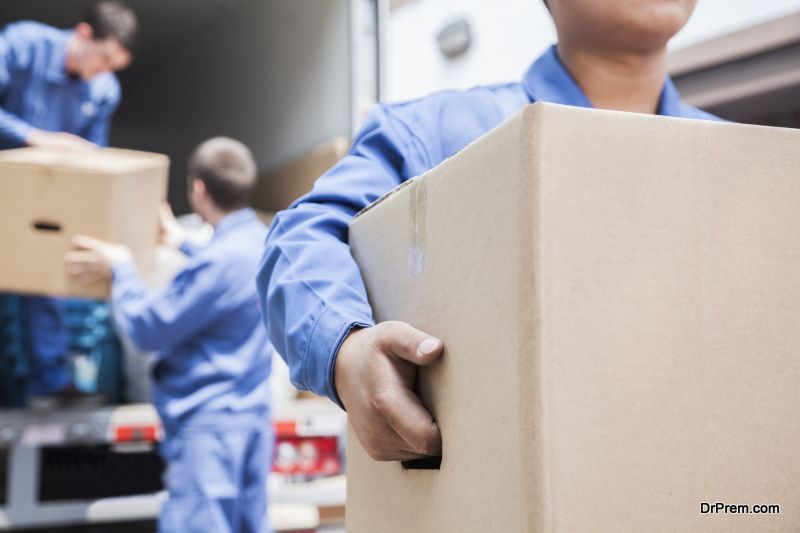Studies have shown time and time again that moving house is one of the most stressful life events a person can go through, and not just because of the sheer amount of logistical effort it takes. Moving house is synonymous with a major life change and represents a transition from our familiar law and order to something unknown.

Human beings aren’t programmed to like changes, especially when that change doesn’t just occur over the period of a day, but what feels like months of watching cardboard boxes slowly multiply over any available surfaces and the ensuing ripple effect of change throughout your life. Not only you need to get to know the layout of a new home, but a new area, while settling into new routines, schools and communities. That’s without mentioning all the paperwork involved.
It’s completely normal to feel some form of anxiety, worry or stress over moving house, but that doesn’t mean you can’t make any effort to mitigate it
We’re not promising that by following these tips you’ll become the Zen master of moving, but they’ll definitely help make the moving process easier and maybe, even a little enjoyable.
Planning In Advance
The key to anything in life is to make plans like the scouts and be prepared, in the weeks before you move there are a number of things you can get busy readying for the big day.
Create a Moving Planner
A moving planner is going to act as your moving bible; containing any and all important dates, receipts for services booked, business cards and even paint swatches, depending on how organised you really are.
Keeping a moving day checklist handy is always a useful tool, enabling you to to tick off steps as you go.
In the chaos of the move, it’s helpful to be able to source all your information from one place, without worrying about important documents getting packed away with your clothes. Similarly, as an obsessive to do list-er, the ability to collect your thoughts in one place is an instant anxiety soother.
Budget
Your moving planner is also a great way to keep track of your budget. Moving home can easily snowball into a massive expenditure, from hiring a removal company to packing equipment, even taking the day off work. Developing a strict budget and gathering together cost estimates in advance can help structure your move, and minimize financial stress.
Order Utilities in Advance

Ordering new utilities in advance allows you to shop around for the best provider prices, and ensures that by the time you’re ready to move in, you won’t be moving into a house without hot water or electricity.
Similarly remember to tell any important bodies about your move, such as your local council, insurance provider and bank.
Talk to the Seller
If you can, try and come up with a list of questions about your new home for the seller of house, as they can offer some valuable insights into your new home and your new area – as well as clearing up some important admin, like a forwarding mailing address.
Scout out your area
Doing a quick recon of your new area before the move is helpful in a number of ways. Not only will you be able to figure out the best places to unload your car or van, but familiarising yourself with your new surroundings will help to ease the anxiety of moving into the ‘unknown’.
Equally, pre-determining the best route to get to your new home can help to ease on the day stresses, allowing you to best avoid areas with high traffic and offering up the comfort of semi-familiar landmarks.
Planning for the Day
As the countdown to the moving day begins in earnest, start arranging the on-the-day essentials.
Moving Day Survival Kit

A moving day survival kit is all you need to get you and your family through the moving day unscathed, and provide a little support if things go drastically wrong. Pack as if you were going on a small camping trip – minus the tent – and include anything essential for your daily living out in the wilderness; toilet paper, shampoo, flashlight, a towel and a change of clothing for each family member, snacks, food and plenty of water.
Make sure you include all your important moving documents such as passports and leasing agreements. Keep your survival kit easily accessible throughout the day and make sure it stands out from the rest of the luggage with bright labels.
Removals Company vs Do it Yourself
One of the biggest decisions you’re going to make on the day is whether you choose to move by yourself, or get a rental company to do the heavy lifting for you.
If you’re moving out of a large house with a lot of furniture, it’s probably a fairly easy decision to make, especially as some movers will even offer a packing service, as the cost of a rental with enough space probably costs as much, if not more, than hiring a removal service – with all of the added stress.
Either way, it’s important to get a full estimate of the costs and weigh up the pros and cons of each approach, and research on the removal companies, before tying yourself into a decision.
Packing
Packing is an art form, one that seems nearly impossible to get the hang of. Even if you’re a chronic hoarder, or live in a carefully controlled environment of organised chaos, there’s still a few things you can do to make sure everything runs smoothly on the day.
Before you even begin packing, try and ascertain an estimate of how much packing material you’re going to need, and what kind. While your clothes can be easily folded up into suitcases, more delicate items may need sturdier crates and cushioning, depending on how far and by what mode of transport you’re planning to travel in.
While it feels a little like relegating yourself to limbo with boxes all over the house, start searching for the best places to get boxes long before you pack, giving yourself time to shop around for freebies or cheap deals and ensuring you’ve got enough to pack all your items.
Similarly, try and create some sort of hierarchy when you pack. Label each box with regard to its importance in your first few days in your new home, then, make sure these boxes are packed last and are the most accessible.
Although it is an inevitable part of moving to live in a cardboard jungle for at least a few days after the move day, you can mitigate the effects by ensuring you’ve got everything you need to live comfortably in reach as you find the time to begin the dreaded unpack.
Ask for Help Moving

If you’re planning on moving home without a rental company, inviting along some friends or family will make the day 10 times easier. As well as having an extra few pairs of hands to do some of the lifting, spending time around people you know and love will help ease those moving jitters and take your mind of some of the bigger impacts of the day.
Always try and give people a 2 or 3 week notice period, and it always helps to chuck in a friendly bribe of pizza or wine.
On the Day
When the day finally comes around, try to remain as relaxed and as flexible as you can. You’ve come armed with a pretty good game plan and enough supplies to outlast a zombie apocalypse, although things might inevitably go wrong, there’s no reason why they can’t be put right.
As you move in, make sure that everything is as it was detailed in your leasing agreement, and, if in a rental property, make sure to photograph everything to cover your own back against the security deposit.
Essentially, you’ve already done the hard part, you’ve found a new home and you’ve made it there with you; and your belongings in one piece and everything squared away, all that’s left to do is enjoy yourself in peace!
Article Submitted By Community Writer




